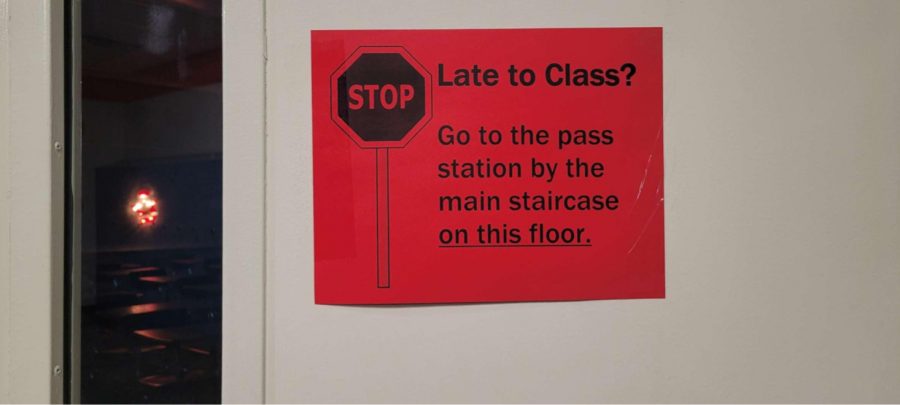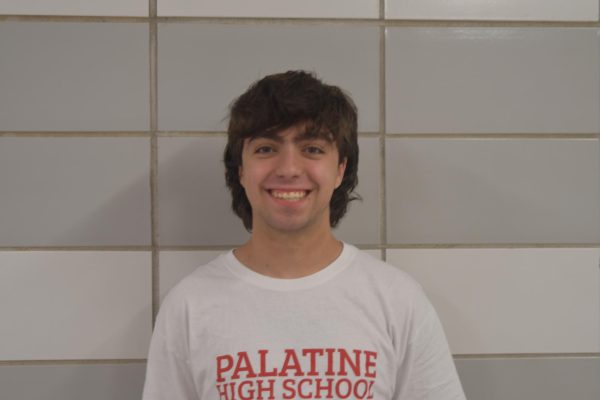New shut-the-door policy aims to decrease student tardiness
Signs outside classroom doors direct students, who are late, with instructions to go to the pass station.
December 17, 2021
Teachers shut the door on tolerance for late students as Palatine High School established a new tardy policy.
Concerns from administration have prompted the implementation of this new procedure.
“This year, we have had a significant increase in students that are tardy for class,” Assistant Principal Volgi said. “It’s been tough for teachers to get their classes started on time with a lot of kids still in the hallways going to class late. And honestly, we’ve seen a little bit of an increase of negative interactions in the hallways.”
As soon as the bell rings teachers are instructed to lock their doors. Any students left in the hallway will have to go to the designated tardy pass stations and scan in using their ID. After they receive their designated floor passes, they can return to class and be let in.
“That allows us to…track the number of tardies at a little bit more of an efficient pace,” Volgi said.
Administration has not been able to keep up with the detention punishments that are supposed to be allotted when students are truant multiple times.
“And it is a struggle that’s happening across the nation right now,” Volgi said. “We know that there are some districts around that have been doing this not just this year, but for a number of years prior. And we’ve heard some really positive results.”
There has been a sharp decline in the number of tardies in the first week of implementation. The tardy policy is being incorporated currently, but will be fully established at the beginning of next semester.
“The aim is to cut down on the tardies and get students in class, where they make the best connections with their teachers,” Volgi said.
Staff at PHS have taken from many places to come up with a solution.
“There are some staff members that had previous experience with some of these other schools that they were at,” Volgi said. “As well as kind of reaching out to some other schools to see how they’re doing. And you know, from there, we felt that we adapted it to how it would best fit here at Palatine.”
Most students do not see the point in having the shut-door policy.
“In my opinion, the tardy policy is not as effective as administration thinks that it is,” junior Marianne Ciomek said. “Ultimately, locking the doors during class encourages students to skip school,” Ciomek said.
The results administration has seen from other pilots of the policy lead them to believe it will be the best for the student environment at PHS.
“Through our discussions with staff and even students, we concluded that we needed to implement this system to best support students and their learning,” PHS assistant principal Chris Cirrincione said. “The number of tardies and truancies were a distraction to classes and led to additional issues within the hallways.”
However, students believe the program will be counterintuitive to student health.
“Overall, I think that it just frustrates students and causes increased anxiety especially when they have to go to the bathroom during the passing period or take care of another issue…they are worried about getting to class on time,” Ciomek said.
Schools like Daniel McLaughlin Therrell High School in Atlanta, Georgia and Morgantown High School in Morgantown, Virginia have a similar policy enacted in their school, with students receiving in-school suspension once they receive three to four or more tardies. However, the school is stricter than PHS as they still require a “grade-level tardy pass” from a hall monitor even if you have received one from a teacher.
“The goal is to ensure that students know that it is not okay to be tardy and that poor decisions have consequences,” DMTHS administration said in the letter outlining the policy.
PHS already has a detention per unexcused absence policy, but the inefficiency of it led to the implementation of the shut-door procedure.
“Since we were implementing this system mid-year, at the end of the first semester, we were looking for a system that was easy for staff and students to understand and follow,” Cirrincione said. “At the same time, we wanted to increase communication and transparency within the tardy and truancy system.”
The system has ways to go. For example, students that were late due to their bus would also have to go to the same tardy stations. Now they have added a late bus station on the first floor.
“Since this is a new system to PHS, we will continue to make changes and improvements based on the feedback we receive and the results,” Cirrincione said. “As of now, we will continue to enforce this policy during second semester.”









